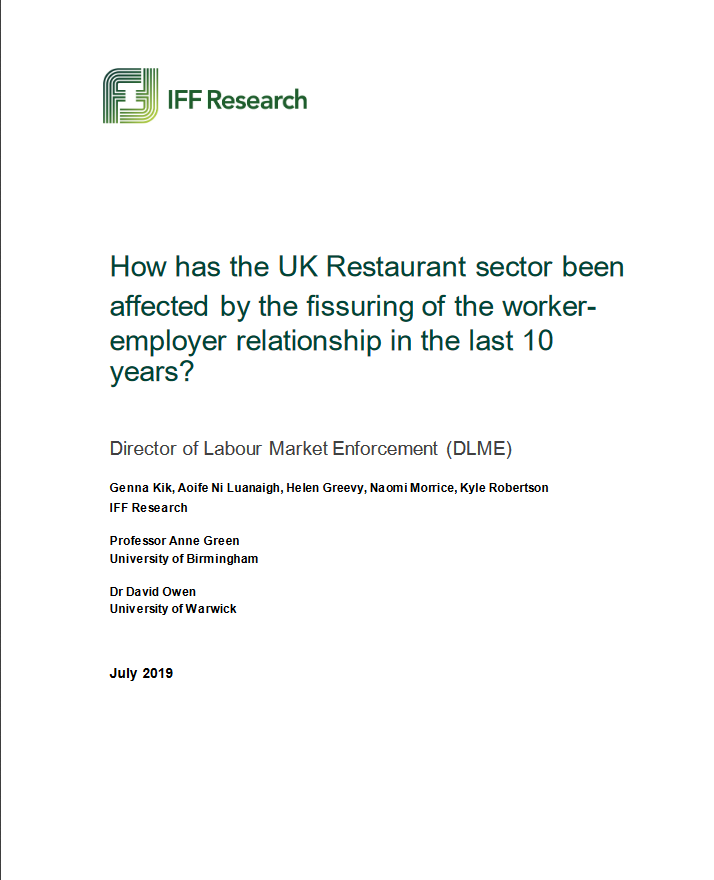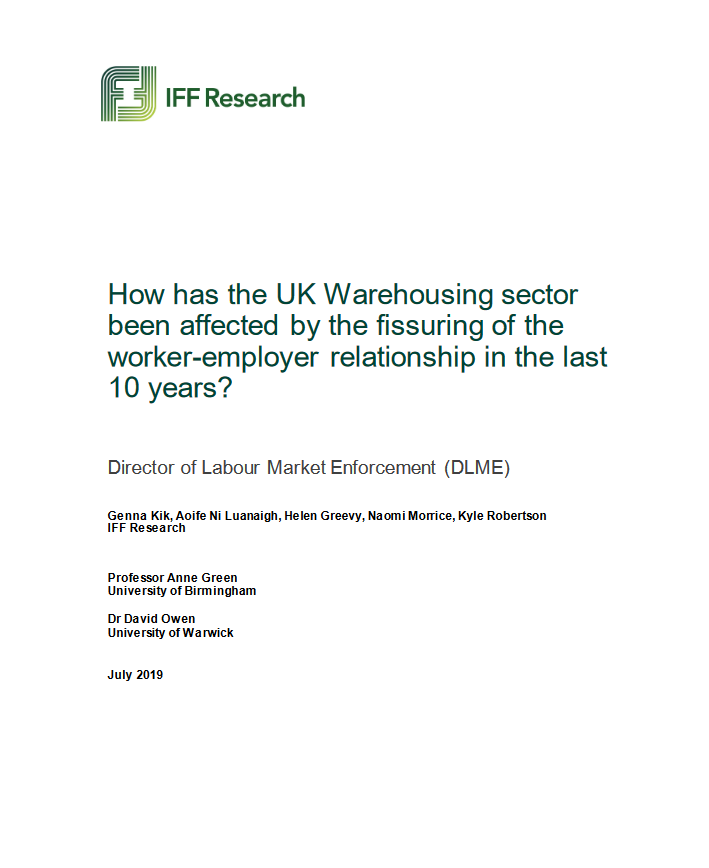How have the UK restaurant and warehousing sectors been affected by the fissuring of the worker-employer relationship in the last 10 years?
THE REPORT IS NOW AVAILABLE HERE
These two studies were conducted in partnership with IFF Research and CIty-REDI (University of Birminfgham) on behalf of The Office of the Director of Labour Market Enforcement via BEIS (through UKSBS). The projects were “How has the UK restaurant sector been affected by the fissuring of the worker-employer relationship in the last 10 years?” and “How has the UK warehousing sector been affected by the fissuring of the worker-employer relationship in the last 10 years?”. The Restaurant sector was defined as SIC 2007 industry classes 56.1 - “Restaurants and mobile food service activities”; 56.2 - “Event catering and other food service activities”; and 56.3 - “Beverage serving activities”.The Warehousing and storage subsector (SIC 52.1) is part of the broader Warehousing and distribution sector (SIC 52).
In both studies, the research consisted of two elements - secondary desk research and primary qualitative interviews. The desk research involved a data review and a literature review. The data review focused on the structure of the business population, including: size and number of businesses in the sector by country and region; overall employment, including the occupation profile of the workforce and use of non-UK workers; and recruitment methods used in the industry. The literature review focused on employment relationship issues, the characteristics of the sector and broad trends in sector composition and employment over time.
The primary qualitative research was undertaken with stakeholders and workers in each sector. IFF spoke to 6 industry stakeholders and 32 workers in the Restaurant and Food Service sector and 8 stakeholders and 32 sector workers in the Warehousing sector. The stakeholder interviews lasted for an average of an hour each, and the worker interviewers for an average of 50 minutes each. All the stakeholder interviewers were conducted by phone. The worker interviews were a mix of face-to-face and telephone interviews.
The literature review and interviews suggest a number of reasons for non-compliance with employment legislation in the restaurant sector. Competition in the sector is one of the key drivers of non-compliance, as employers seek to cut costs. Other drivers include:
- Low levels of union membership - Labour Force Survey data shows that only 3.2 per cent of workers in the food and Restaurant sector were trade union members in 2017 (compared to 13.5 per cent of all private sector employees in 2017)5.
- Cost pressures – changes in National Minimum Wage (NMW)/ National Living Wage (NLW) and other benefits.
- Contracts – zero-hours contracts and issues around holiday entitlements.
- Agencies and umbrella companies – disjointing the employer and employee relationship.
- Level of more vulnerable workers in the industry – young workers and migrants.
- Insufficient enforcement or guidance from government.
In warehousing, compliance with labour regulations is variable across the sector. While there are many ‘good’ employers and agencies, there are also some who pay less attention to employment rights legislation. There is a spectrum of non-compliance, ranging from advanced fee fraud to employers that genuinely do not realise they are in breach of legislation.
Drivers of non-compliance with employment rights legislation include: long supply chains that make it difficult for workers to know who they are engaging with; widespread use of agencies and umbrella companies including some who do not respect relevant legislation; use of non-standard contracts; business pressures driven by large retailers forcing down costs; and workers’ lack of understanding of their legal status/rights.
Warehousing workers reported a variety of employment rights breaches. There were three key areas where common breaches occurred:
- Breaks – Being told or asked not to take breaks tended to occur when there was a high level of work to get through and targets were not being met. Workers on less secure contracts were more likely to feel pressured to work through their breaks and not challenge employers.
- Pay – Common issues around pay involved either not being paid for all the hours worked or not being paid on time. Overall, not being paid for the total number of hours worked was slightly more common than not being paid on time. Both instances were generally seen to be due to administrative errors; however, some occasions may have been intentional noncompliance by the employer.
- Health and Safety – Lack of appropriate equipment and space to conduct work safely was noted by workers. Healthy and safety concerns were reported by both junior and senior members of staff.
The following breaches were less common:
- Contract – Not being given a written contract was experienced by a small proportion of workers.
- Harassment – Predominantly verbal harassment was reported by some more junior members of staff.
- National Minimum Wage (NMW) / National Living Wage (NLW) – Being paid below NMW / NLW was not experienced by any of the workers that we spoke to, but some workers did believe that this occurred in the industry and non-UK workers were the most at risk.
The findings of the project contributed to the development of the Labour Market Enforcement Strategy 2019/20 by the ODLME, which was published on July 22nd 2019. This makes 12 recommendations spanning three cross-cutting themes: prioritisation of enforcement resources; helping employers get it right; and using joint working to tackle more serious and persistent non-compliance in the labour market. The Strategy and the accompanying research reports can be found at: https://www.gov.uk/government/publications/labour-market-enforcement-strategy-2019-to-2020.
To complement the 2019/20 Strategy, the Director also commissioned five independent research reports which have been published alongside the Strategy. Three of these studies focused on the worker-employer relationship in three of the DLME’s priority sectors, specifically: warehousing, restaurants and food services, and hotels. In addition, two scoping papers were produced: one sought to determine how best to carry out an evaluation of the full impact of the three bodies’ activities, while the other considered how best to assess the scale and nature of labour market non-compliance. The IER (with IFF Research and City-REDI) produced the reports on warehousing and the restaurant & food services sector.
Project Team:
David Owen (Principal Investigator)
Project Duration:
October 2018 - May 2019
Project Funder:



